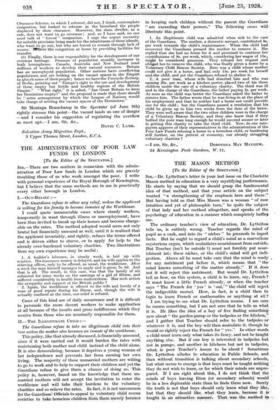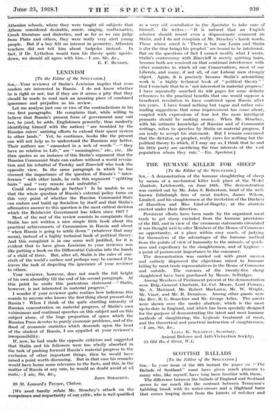THE MASON METHOD [To the Editor of the SPECTATOR.] Lyttelton's
letter in your last issue on the Charlotte Mason method in education is a very mystifying performance. He starts by saying that we ahould grasp the fundamental idea of that method, and that your article on the subject wanted " a strengthening of the emphasis here and there." But having told us that Miss Mason was a woman " of rare intuition and ' yet of philosophic turn," he quits the subject of that. lady and her method 'altogether, and speaks of the psychology of education in a manner which completely baffles ' me.
The ordinary teacher's view of education, Dr. Lyttelton tells "us, is entirely wrong. Teacher regards the mind of pupil as a cask, and into its " niches " he proceeds to-ingeSt fact.S. • Bid he ought to regard a child's mind asa marvellous mysterious organ, which assimilates nourishment from outside. But Teacher (isn't he outside ?) must not forcibly put nour- ishinent into these niches, or the child's mind will get indi- 'gestion. AbOVe all he must take care that the mind is ready for any nutriment put before it, which means that ,‘.‘ the mind 'knows something of the matter already." If it does not it will reject this nutriment. But would Dr. Lyttelion . 'tell ns hew', On this SyStem, a child to learn, say, Freneh ? It must knoisi a little French already; or when the teacher says " The French for ' yes' is oui,' "tile child willreject the indigestible morsel. How, in tact, is -a -child then to . begin: to learn French or mathematics or anything at all ?
I am trying to -see what Dr. Lyttelton means. I am sure he means something, but I am net sure that he tells us what it is.- He likes the ide& of a "boy of five finding something new about " the garden-pump or the tadpoles or the kitchen," and I gather that Teacher ....d refer to the tadpoles or whatever it is, and the boYwill then assimilate it, though he .would.so-rightly reject the French for " yes." In other words a child must learn only what takes its fancy, and not be taught anytbing,else. But if one boy is interested in-tadpoles but not in.pumps, and another- in kitchen& but not in tadpoles, whai is poor Teicher's lesson to be" about ? Sometimes Dr. Lyttelton alludes to - education in Public Schools, and then -without. transition is talking about secondary schools, but what seems to emerge is that boys must be taught nothing . they do not wish to learn, or for which their minds are unpre- Pared. 'If I am right abOut thiS, I do not think that the minds of boys leaving Eton (or secondary schools)- would be in a- less deplorable state than he finds them now. Surely the truth is not that boys should only learn what they like, but that they should like: what 'they • learn,.: because it ig ' taught in an attraetive: manner: - -1114 was • the -method -in
Athenian schools, where they were taught all subjects that Athens considered desirable, music, singing, mathematieS, Greek literature and dialectics, and as far as we can judge from Plato and others, they were really very alert young people. • But if a boy felt no interest in geometry, Athenian teachers did not tell him about tadpoles instead. In fact, if Dr. Lyttelton would turn his theory quite upside- down, we should all agree with him.—I am, -Sir, &c., E. F. BENSON.































 Previous page
Previous page